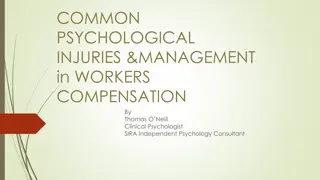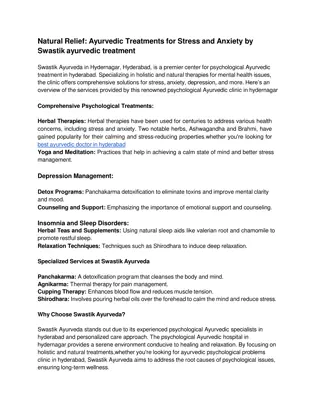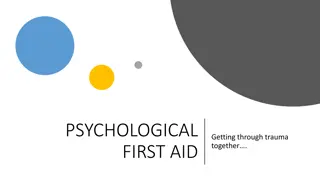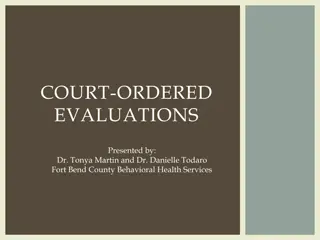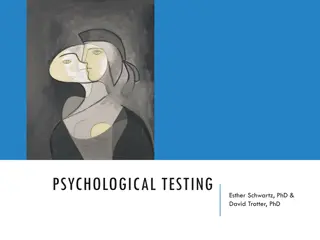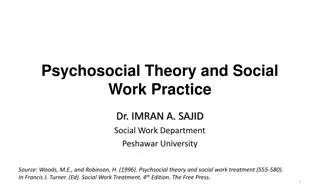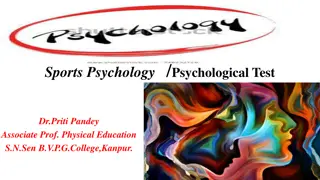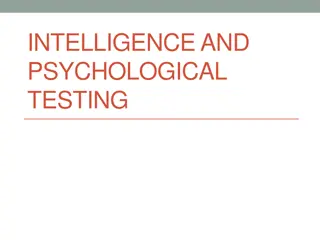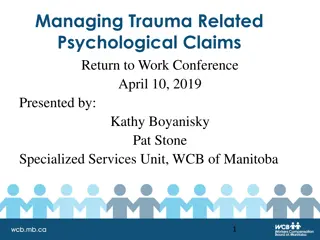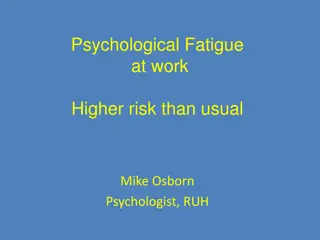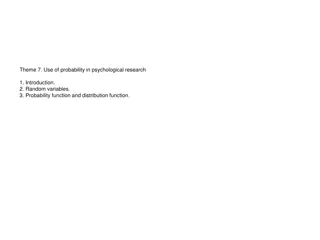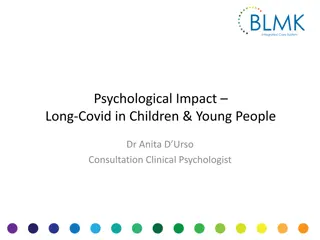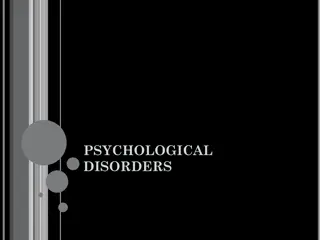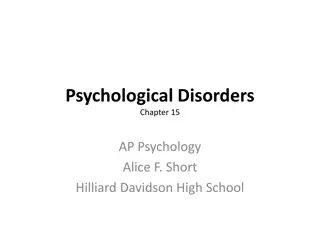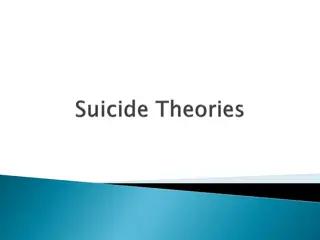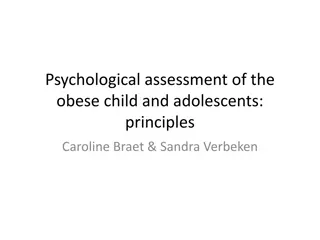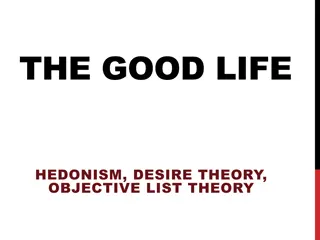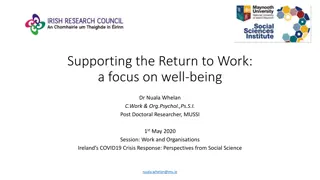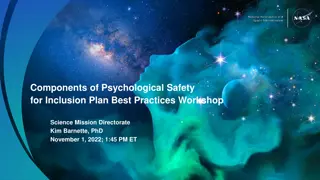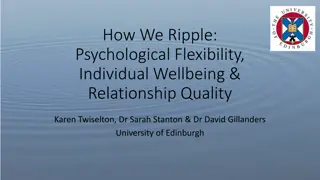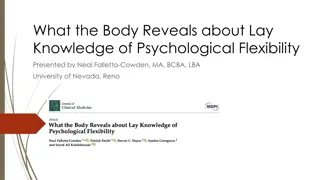Understanding Psychological Claims in the Workplace
Exploring the rise of psychological claims in work comp, this information covers types of mental stress claims, psychological claim regulations by state, standards of causation for physical injury-mental stress and mental stress-mental stress, as well as examples of how work-related stress can impac
1 views • 22 slides
Responsibilities in Ensuring Psychological Health and Safety
The primary duty of care under the WHS Act 2011 encompasses physical and psychological health. Non-compliance can lead to significant penalties, including fines and imprisonment. To address psychological impacts, implementing strategies like ALGEE from Mental Health First Aid Australia can help redu
0 views • 8 slides
COMMON PSYCHOLOGICAL INJURIES &MANAGEMENT in WORKERS COMPENSATION
Discover insights on common psychological injuries, such as adjustment disorders, depression, and PTSD, prevalent in the workplace. Gain knowledge on identifying signs, symptoms, and providing crucial support as a case worker. Learn about good mental health, stress responses, and ways to manage psyc
3 views • 17 slides
Understanding and Fostering Psychological Safety at Work
Patricia Murray, a Senior Organizational Psychologist, discusses the importance of recognizing and promoting psychological safety in the workplace. The webinar covers evidence from research, the impact of threats on psychological safety and health, strategies for addressing prolonged exposure to uns
0 views • 17 slides
psychological treatment- Swastik 07_06_2024
We are best Psychological Problems Ayurvedic Treatment and Therapy Specialist Doctor in Nizampet, Kphb, Miyapur Hyderabad. Swastik Ayurveda is one of the best clinic for Psychological Problems.
2 views • 2 slides
Evolution of Mathematical Theories and Proof Systems
Development of mathematical theories such as model theory, proof theory, set theory, recursion theory, and computational complexity is discussed, starting from historical perspectives with Dedekind and Peano to Godel's theorems, recursion theory's golden age in the 1930s, and advancements in proof t
1 views • 29 slides
Understanding Psychological First Aid in Times of Disasters
Explore the psychological impact of disasters, learn the common reactions, and understand the core actions of Psychological First Aid (PFA). Discover how stress and disasters affect communities and individuals, common reactions to disaster stress, and when professional help may be needed.
0 views • 42 slides
Psychological Theories of Criminality: Understanding the Roots
Psychological theories of criminality delve into the association between intelligence, personality, learning, and criminal behavior. Major theories include Psychodynamic Theory by Freud, Behavioral Theory by Bandura, and Cognitive Theory by Kohlberg. These theories explore how unconscious mental pro
1 views • 20 slides
Court-Ordered Psychological Evaluations and Processes
Explore court-ordered psychological evaluations presented by Dr. Tonya Martin and Dr. Danielle Todaro from Fort Bend County Behavioral Health Services. Understand the purpose, information provided, and expert requirements for such evaluations. The evaluation process involves reviewing records, clini
0 views • 68 slides
Psychological Assessment and Testing Overview
Psychological testing is a vital component of psychological assessment, used to evaluate intelligence, achievement, personality, and psychopathology. This involves gathering information, administering standardized tests, and interpreting results to make diagnoses and recommendations. However, there
0 views • 25 slides
Understanding Psychosocial Theory in Social Work Practice
Social work practice has always integrated psychosocial concepts to address human well-being and social functioning. Psychosocial caseworkers aim to help clients navigate challenges stemming from environmental imbalances. The term "psychosocial" refers to the interaction of psychological and societa
0 views • 27 slides
Analyzing and Evaluating Psychological Concepts
This content provides a comprehensive guide on how to analyze, evaluate, explain, justify, and apply psychological concepts effectively. It covers examining in detail, comparing strengths and weaknesses, demonstrating knowledge, making judgments, and presenting clear accounts, supported by evidence.
0 views • 14 slides
Understanding the Theory of Firms: Neoclassical vs. Modern Approaches
The theory of firms is explored through the Neoclassical and Modern perspectives. Neoclassical theory focuses on profit maximization, while Modern theory delves into managerial, principal-agent, and transaction cost theories. The discussion covers criticisms of Neoclassical theory and the essential
1 views • 79 slides
Understanding Sports Psychology and Psychological Testing in Psychology
Exploring the realms of sports psychology, psychological testing, pioneers of psychology, and methods of psychology. Delve into the study of the mind, behavior, consciousness, soul, and the various types of psychological tests.
4 views • 28 slides
Unbound Minds Psychological Clinic For Children And Adolescent | Book Now
Unbound Minds Psychological Clinic, is a top-notch psychological clinic, we dedicated genuine & best psychological treatment with professional team. Get certified treatment with more benefits. Hire our experienced psychologist and get rid of stress a
1 views • 2 slides
Understanding Sexual Dysfunction and Associated Factors
Sexual dysfunction encompasses a range of issues that can affect individuals, with causes including psychological, neurological, hormonal, and relationship-related factors. Evaluating sexual problems involves considering duration, context, and frequency. Psychological causes, such as anxiety and str
0 views • 25 slides
Understanding Psychological Testing: Key Concepts and Applications
Psychological testing encompasses various measures to assess intelligence, abilities, aptitudes, personality traits, and more. These tests are standardized to ensure reliability and validity, providing valuable insights into an individual's psychological profile. Key concepts include mental ability
2 views • 18 slides
Understanding George Kelly's Personal Construct Theory in Personality Psychology
George Kelly's Personal Construct Theory explains how individuals perceive and organize their world by formulating and testing hypotheses, just like scientists. These personal constructs shape our unique views of events, influencing how we interpret reality and make decisions. Kelly's theory of cons
0 views • 23 slides
Theories of Causation in Psychological and Social Sciences
Overview of theories of causation categorized into psychological, social psychological, and sociological perspectives. Psychological theories focus on instinctive, biological, and psychological qualities of abusers, including Attachment Theory, Psychodynamic Theory, Social Learning Theory, and Situa
0 views • 15 slides
Strategies for Managing Psychological Claims in the Workplace
Explore effective tools and techniques for managing trauma-related psychological claims in the workplace. Learn about common psychological diagnoses, comorbidities, and strategies for communication and intervention. Discover the importance of work-life balance and enhancing recovery outcomes for emp
0 views • 46 slides
Evolution of Light Theory: From Wave Theory to Quantum Theory
At the turn of the century, the discovery of the photoelectric effect challenged the wave theory of light, leading to the development of the quantum theory by Max Planck and Albert Einstein. This new theory introduced the concept of discrete energy units known as quanta, bridging the gap between wav
1 views • 62 slides
Understanding Psychological Fatigue at Work: Insights from Mike Osborn, Psychologist
Small behaviors and everyday experiences can significantly impact our health, especially in high-performance work environments like hospitals. Psychological fatigue can lead to cognitive disruption, misplaced guilt, and decreased well-being among staff. It is essential to prioritize self-compassion,
0 views • 19 slides
Psychological First Aid: Supporting Individuals Through Crisis
Psychological First Aid (PFA) is a compassionate intervention aimed at stabilizing acute distress and facilitating continued care after a crisis. PFA focuses on meeting basic needs, stabilizing reactions, fostering resilience, and providing emotional support. Key components include comfort, protecti
0 views • 16 slides
Understanding Probability in Psychological Research
This article delves into the use of probability in psychological research, covering key concepts such as random variables, probability functions, and distribution functions. It explains fundamental ideas like random experiments, sample spaces, types of sample spaces, events, and the formal approach
1 views • 14 slides
Psychological Impact of Long Covid in Children and Young People
Psychological impact of Long Covid in children and young people includes sleep problems, worsening of pre-existing psychiatric symptoms, emotional distress like depression and anxiety, and mixed results in terms of quality of life and resilience. Beyond physical symptoms, psychological effects such
2 views • 5 slides
Effectiveness of Psychological Intervention in Managing Stress and Depression Among Cancer Patients
A study was conducted to assess the effectiveness of a psychological intervention program in managing stress, depression, and subjective well-being among cancer patients. The study involved 132 cancer patients aged 35 to 65 years, with 72 patients in the experimental group receiving psychological in
1 views • 48 slides
Importance of Emotional Support in Cancer Care Optimization
Emotional support plays a crucial role in cancer care, yet psychological services are limited. Creative approaches like integrating physical activity sessions, nutritional support, and psychological resources are key. Additional training for psychological support, self-management focus, and managing
0 views • 7 slides
Understanding Psychological Disorders and Diagnosis
Explore key concepts like the medical model applied to abnormal behavior, criteria of abnormal behavior, stereotypes of psychological disorders, psychodiagnosis, prevalence of psychological disorders, and a specific focus on anxiety disorders such as generalized anxiety disorder. Learn about differe
0 views • 35 slides
Enhancing Sports Performance Through Psychological Skill Training
Sports psychology delves into the psychological factors affecting athletic performance, emphasizing the importance of Psychological Skills Training (PST) to equip athletes with mental skills tailored to their individual needs. These skills techniques help in enhancing self-confidence, goal-setting,
0 views • 29 slides
Overview of Psychological Theory in Literature
Psychological theory in literature encompasses two critical viewpoints - one focusing solely on the text itself and the other on the author. The first approach delves into conflicts, characters, dream sequences, and symbols present in the work, revealing inner desires and conflicts within characters
0 views • 17 slides
Understanding Psychological Disorders: Theoretical Approaches and Abnormal Behavior
Explore the realm of psychological disorders through theoretical approaches such as the Biological, Psychological, and Sociocultural models. Delve into the complexities of abnormal behavior, including definitions and examples. Gain insights into the impact of biological, psychological, and sociocult
0 views • 47 slides
Theories of Interest in Microeconomics II
Explore various theories of interest in economics, including the Classical Theory, Liquidity Preference Theory by Keynes, Productivity Theory, Abstinence Theory, Time-Preference Theory, Fisher's Time Preference Theory, and the Loanable Fund Theory. These theories offer different perspectives on the
0 views • 6 slides
Significance of Psychological Theories in Understanding Suicidal Behavior
Psychological theories play a crucial role in guiding research, clinical work, and the development of new hypotheses related to suicidal behavior. The Interpersonal-Psychological Theory of Suicidal Behavior emphasizes social forces, such as disturbed regulation of individuals by society, social inte
0 views • 14 slides
Psychological Assessment of Obese Children and Adolescents
Principles of psychological assessment in obese children and adolescents are discussed, including the Dietary Restraint Theory (DRT), Affect Regulation Theory (ART), Reinforcement Sensitivity Theory (RST), and Diathesis-Stress Model (DSM). These theories explore the cognitive, emotional, and environ
0 views • 5 slides
Exploring The Good Life: Hedonism, Desire Theory, and Objective List Theory
Delve into the concepts of Hedonism, Desire Theory, and Objective List Theory to understand what constitutes a good life and the pursuit of well-being. Explore different value theories, the debate between subjective and objective values, and the philosophical perspectives on happiness and pleasure.
0 views • 60 slides
Supporting Well-Being for Return to Work Amidst COVID-19 Crisis: Focus on Psychological Health
Amidst the challenges of returning to work post-COVID-19, it is essential to prioritize well-being and psychological health for a successful transition. Dr. Nuala Whelan's research sheds light on the impact of unemployment, emphasizing the need for support in job matching, upskilling, and psychologi
0 views • 9 slides
The Relationship Between Cognitive Flexibility and Psychological Flexibility After Acquired Brain Injury
This study explores how cognitive flexibility and psychological flexibility interact after an acquired brain injury. It examines whether individuals who exhibit cognitive inflexibility can achieve psychological flexibility, considering the impact of cognitive impairments post-injury. Cognitive flexi
0 views • 21 slides
Understanding Psychological Safety for Inclusive Environments
This presentation explores the components of psychological safety according to current research, emphasizing its role in fostering inclusive environments. It delves into the NASA Science Strategic Approach, defines psychological safety based on Dr. Timothy Clark's 4-stage model, discusses team psych
0 views • 11 slides
Psychological Flexibility and Relationship Quality Study
This study explores the relationship between psychological flexibility, individual wellbeing, and relationship quality. It reveals correlations between psychological flexibility, positive affect, negative affect, satisfaction with life, psychological wellbeing, and relationship quality in romantic r
0 views • 18 slides
Understanding Psychological Flexibility through Embodied Knowledge
Psychological flexibility plays a crucial role in mental well-being and behavior. This study explores whether untrained individuals can grasp psychological flexibility concepts based on body language and how people physically express flexibility or inflexibility in response to challenging situations
0 views • 18 slides


